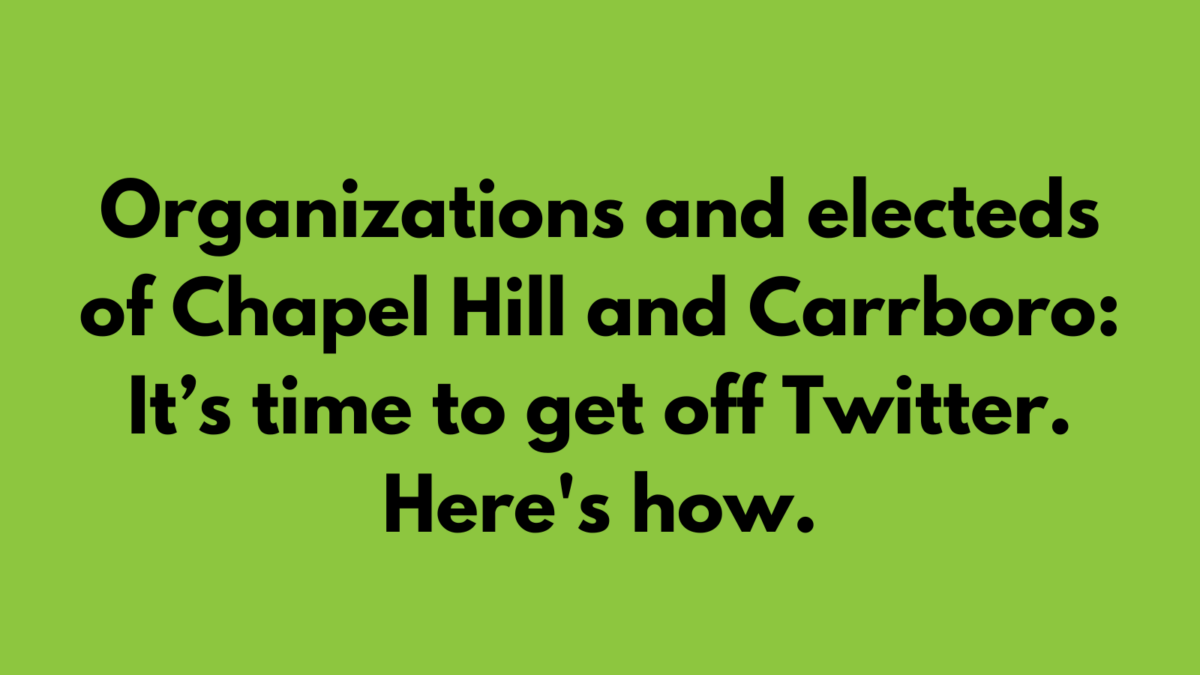There’s no denying that for a period spanning more than a decade, Twitter pushed forward our notion of a Digital Public Square. Whether silly or consequential, over the years an expectation developed that people and organizations wanting to communicate with the public needed to establish a presence on Twitter. Many of our electeds and local government departments followed suit (as did we.)
Under its current private ownership, however, Twitter has shed many of the safeguards against misinformation and toxic content, and different communities, brands, and public figures have reevaluated their social media strategies, leaving Twitter (now ?) by the wayside in the process. In the past several weeks, major advertisers pulled their ads in response to the owner’s endorsement of an an antisemitic conspiracy theory. We’ve seen more in the past several days, as racist, conspiracy-laden public figures have been allowed back on the platform, championed by the owner.
If you’re a local business, non-profit, or elected official in Chapel Hill or Carrboro still posting to ? because you don’t know where else to post, or believe that it’s too heavy a lift to move yourself or your organization to another platform and get near-real-time feedback from the people you care about reaching, we have good news for you!
There are plenty of options! (You can find Triangle Blog Blog, for instance, on Instagram, Threads, Bluesky, and our newsletter.)
Here’s a short list of text-based platforms, with some pros and cons for each.
Threads
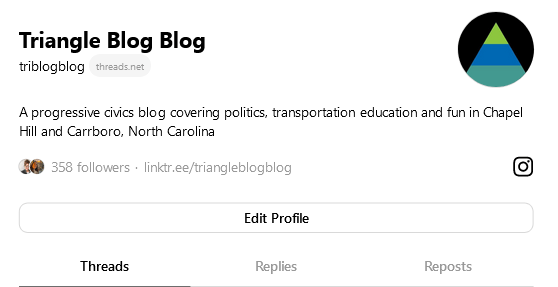
The good news here is that if you already have an Instagram account, you have access to Threads. It functions much like Twitter, with threaded conversations, hashtags, and the biggest user base out of the platforms we’re testing. It’s also easy to create an account for locals, because most local organizations, people, and government accounts are already using Instagram.
Who uses it right now? A number of local politicos are trying Threads out, and it has the biggest local userbase out of the new platforms we’re testing. (It needs lists – we assume they’re coming.) It also seems to have the biggest community of journalists, and other local orgs. Some of the people and orgs we’ve been able to find on there include:
The Town of Chapel Hill: https://www.threads.net/@chapelhillgov
Orange County: https://www.threads.net/@ocncgov
Chapel Hill-Carrboro Schools: https://www.threads.net/@chapelhillcarrboroschools
Daily Tar Heel: https://www.threads.net/@dailytarheel
News and Observer: https://www.threads.net/@newsobserver
Chapelboro: https://www.threads.net/@chapelboronews
Jess Anderson: https://www.threads.net/@jesscooperanderson
Barbara Foushee: https://www.threads.net/@middleb1
Paul Jones: https://www.threads.net/@smalljones
Kirk Ross: https://www.threads.net/@ludkmr
Amy Ryan: https://www.threads.net/@amy4chapelhill
Damon Seils: https://www.threads.net/@damonseils
Karen Stegman: https://www.threads.net/@stegman.karen
Is it easy to use? Yeah, and it’s built into Instagram – making it easy to crosspost. If you’re going to pick one platform, we suspect this one might be the one that takes off locally.
Worth it? We think it has the most potential. They may integrate with other services, like Instagram and Mastodon – making it federated. (That means you may be able to cross-platform posts – a good discussion about this is here.)
Bluesky
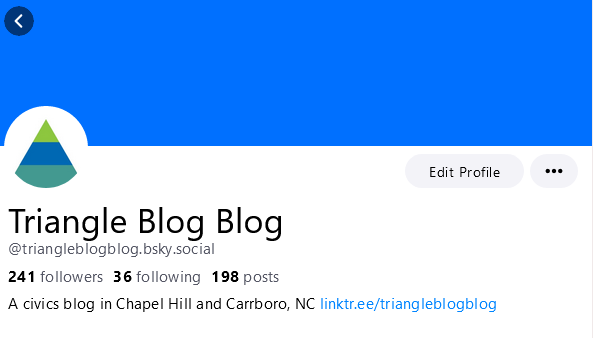
Who uses it right now? Lots of academics. Writers. Some flagship journalism orgs. We’re there, but it’s small.
Is it easy to use? It’s a text-based platform like Twitter and looks and feels like Twitter. The user base isn’t as big.
Is there a local audience? Not for civics. Most of the people we see using it locally are academics. That may be because it’s still invite-only.
Worth it? If you are able to copy and paste content quickly, sure. But we wouldn’t make this your only homebase.
Mastodon
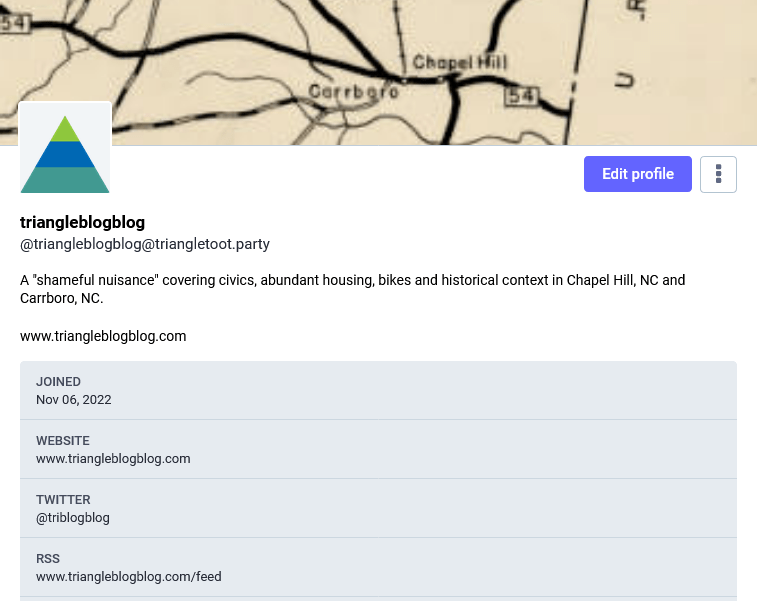
Who uses it right now? Savvy techies. Trekkies. Techies who are also Trekkies. We’re on it, but it feels a bit sparse and hard to use for lay users. We want to switch to another server, for instance, and it’s not easy to do so. There’s not a big civics community on there (though there are larger communities for biking and planning and other topics. Journalism made a go of it, but most of the journalist accounts we’ve seen on there aren’t used much anymore.) The W3C federation – the people who work on the world wide web – are there.
Is it easy to use? Not particularly. But it has potential to communicate with other federated instances.
Is there a local audience? It’s not big.
Worth it? Again, if you can copy and paste – sure. But it’s not going to be a strategy for communicating with various audiences.
Your own newsletter or Substack
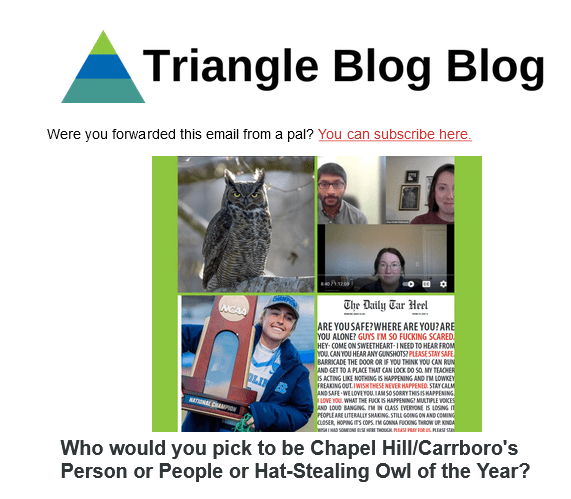
We prefer roll-your-own newsletters to Substack, because Substack has a Nazi problem. (It would also be harder to extract your data if Substack goes under.) We use a service called Email Octopus to run ours – it’s reasonably priced, does what we need it to, and easy to use. (MailChimp is more expensive.)
Who uses it right now? A lot of local politicos have local newsletters. We keep a running list of them here. (Know of something not on this list? Let us know: [email protected])
Pros: It’s a great way to share messages and policy with a local community.
Cons: It’s not two way – so it’s great for getting stuff out but less good for having a conversation.
Is it easy to use? Yes, you can literally start this by bcc’ing email addresses (up to 200) in Gmail. Anything more and you’ll want a newsletter platform.
Is there a local audience: Yep.
Worth it? We love when people write newsletters and try to subscribe to all of the local ones.
Tumblr
Tumblr was huge in the early 2010s and seems to be making a comeback by putting a lot of energy into federation. It’s also pretty easy to automate from another platform. (This is what we do on our Tumblr.) There’s not a lot of locals there right now.
This post was written by Cristóbal Palmer and Melody Kramer.

